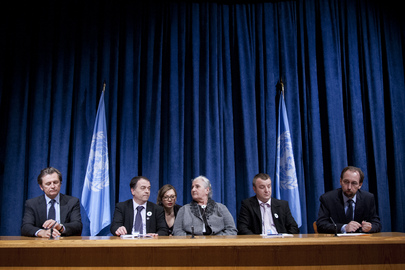
Victims, as the Mothers of Srebrenica, were expelled from the UN General Assembly (UNGA) debate while genocide apologists as the current President of Serbia Tomislav Nikolic were afforded ample platform. In effect, President Nikolic and Vuk Jeremic rationalized new crimes arguing historical grievances. Jeremic, former Serbian Foreign Minister and current UNGA President, schemed a coup of the UN's agenda and the media spotlight, but in the end it was the victims of genocide who had their day at least before global media.
Rationalizing New Crimes on Platform of Alleged Historical Grievances?
The stated objective of the "UNGA Debate" was to analyze and critique venues of international justice including the work of the International Criminal Tribunal for the former Yugoslavia (ICTY) as well as the international response to the conflicts in Bosnia & Herzegovina (BiH), Croatia, Kosovo and Slovenia. From the outset though, it became evident that Jeremic was stacking the panels/discussion in an overt exploitation of his UN post to promote his nationalist appeal for future political office in Belgrade. Prince Zeid Ra'ad Zeid Al-Hussein of Jordan and Ambassador Christian Wenaweser of Lichtenstein, both who have played defining roles during the negotiations of the Rome Statute and progressive evolution of the International Criminal Court (ICC), sought to constructively contribute to the UN debate; but Jeremic completely ignored their proposals for a more balanced and effective discussion. Prince Zeid, (Jordan's UN Ambassador who also served with the UN office and was first-hand witness on the ground in the former Yugoslavia during the 1992-95 conflict and ethnic cleansing), opted not to participate. (Read Colum Lynch's "Jordan to Boycott UNGA's President Session on International Criminal Justice.")

Prince Zeid Ra'ad Zeid Al-Hussein (right), Permanent Representative of the Hashemite Kingdom of Jordan to the UN, Munira Subasic (centre, at podium), President of Mothers of Srebrenica, flanked by Murat Tahirovic (left) & Nikola Findrik of the Association of Witnesses & Survivors of Genocide. Christian Wenaweser (left), Permanent Representative of the Principality of Liechtenstein to the UN.
Kicked out of UN Assembly!
Munira Subasic of the Mothers of Srebrenica, Murat Tahirovic and Nikola Findrik, (Croat leader) of the Association of Witnesses and Survivors of Genocide made the long journey to UN HQ in NYC. However, after having complied all the paperwork and demands stacked in front of them, they were excluded from the debate. Munira, who has lost 20 of her immediate family at Srebrenica, was only offered a seat in the back of the UN auditorium. When Serbia's current president claimed that no genocide had occurred in Bosnia & Herzegovina, Munira quietly put on a T-shirt that read: "Justice may be Slow but it is Inevitable." Soon thereafter, Jeremic's personal guard unit descended upon Munira and forced her out of the UN hall. Asked about the incident at the subsequent news conference, Munira said: "I felt as helpless in the UN hall as I felt that day when Mladic's Serb soldiers took my youngest son from me in front of UN peacekeepers." (Two bones from Munira's son were recently discovered and forensically identified in two separate mass graves around 20 kilometers apart.)
In my conversations with Prince Zeid, Ambassador Wenaweser, and UN Ambassador Mirsada Colaković of BiH, we shared a concern about Vuk Jeremic's agenda, but we focused on the exclusion of the Mothers of Srebrenica and other victim's groups. A UN-based conference was determined to be both an appropriate venue and platform for victims' suffering, but also for efforts of reconciliation.
Passing Baton from Milosevic & Karadzic to Nikolic & Jeremic?
In the statement to the press, Subasic, Findrik and Tahirović shared the misgiving that Nikolic and Jeremic had taken up the project from Milosevic and Karadzic. It is a concern that many Bosnians/Herzegovinians and even Serbs share. Nikolic's and Jeremic's promotion of historical revisionism that denies genocide and accentuates ethnic chauvinism negates what many in Washington and Brussels may wishfully want to see as a more politically progressive Serbia.
Shared Loss & Empathy is Foundation for a more Peaceful Future
While politics is too frequently betraying reconciliation and efforts toward better relations between states in the region, there are also hopeful efforts from those that have suffered the most from the past conflicts in all states and among all ethnic groups. Some nationalist leaders have further employed bigotry and fear of the other to convert it to the currency of political power. Of course, ordinary citizens may be responsible for selecting such leaders, but empathy and desire for peace and better life for family also have their impact upon all. Munira Subasic pointed out the ethnic/religious diversity within her own NGO, but also the cooperation among many NGOs in the region. Serb, Croat, Albanian, Roma, as well as Bosniak (Muslim) and "other" victims of the last conflict, particularly mothers who have lost sons and daughters, have now started to meet and engage for greater cooperation and understanding. While some Serbian authorities according to Munira have threatened to cut off pension benefits of "Serb mothers" (paid to families of killed soldiers) who engage, the efforts and cooperation persist. According to Munira, the mothers share the most human of perspectives: the unyielding vacuum of lost loved ones and empathy for each other's loss.
